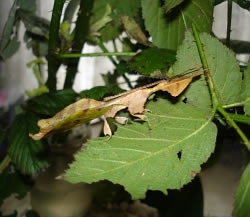Crypsis
The ability for a organism to blend in with its environment. This is often achieved through projections in the exoskeleton of the insect which makes it look like something else. For example, leaf insects resemble leaves and some species do this to such a degree as to include patches that look like mould.
In additional to visual crypsis there is also olfactory crypsis. This is the situation when an organism uses scent to camouflage itself. For example, the Death's-Head Hawkmoth which enters the hives of bees to steal nectar. The moth avoids attack from the bees by mimicking the scent/pheromone of the bees.

The male Leaf Insect looks like dead leaves and is a good example of visual crypsis.
Other names for (or types of) Crypsis include:
- Camouflage
Related terms
- Aposematism
- Batesian mimicry
- Cryptic speciation
- Industrial melanism
- Mimicry
- Phasmatodea
- Pupa
- Thanatosis
Related groups of terms
Back to Glossary
If you have found this glossary useful please consider supporting the Amateur Entomologists' Society by becoming a member or making a donation.
![Amateur Entomologists' Society home page [Logo]](/images/aes-logo-wplant.gif)